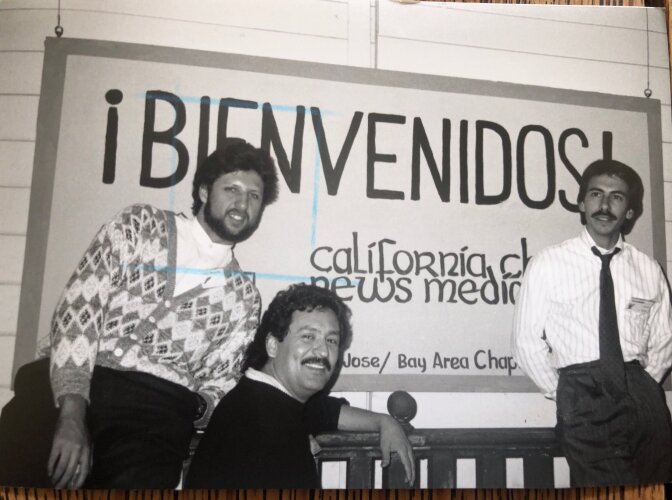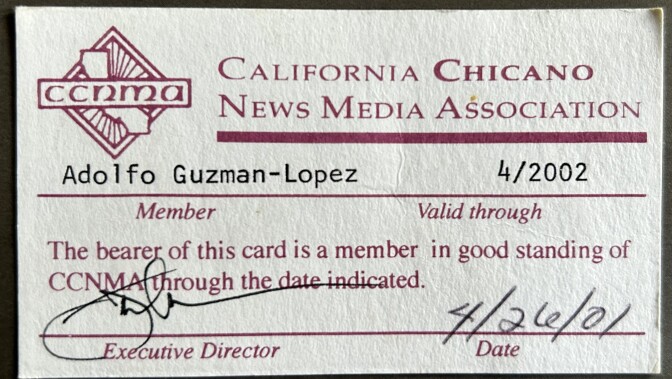This story is free to read because readers choose to support LAist. If you find value in independent local reporting, make a donation to power our newsroom today.
USC Acquires A Half Century Of Archives From Premiere Latino Journalist Advocacy Group

For more than 50 years, the California Chicano News Media Association-California Latino Journalists participated in the rise of Latinos in journalism in California and the United States.
That gave the organization a lot of time to collect things: Photos, documents, reports. Boxes and boxes of them.
As the organization moved offices in L.A. in recent years, leaders realized something had to be done.
“We have to really seriously think how do we keep them from vanishing or being thrown in the trash,” said Justino Aguila, vice president of CCNMA-CLJ and a freelancer who’s written about arts and culture for Billboard, the Seattle Times and other publications.
The group helped Aguila launch his career. He wrote for the Garfield High School newspaper, The Log, and said he’s wanted to be a reporter as long as he can remember. A campus visit by L.A. Times reporter George Ramos, a CCNMA member, was key.

And now, as the group’s vice president and with decades of reporting experience, seeing photos of past young mentees in the boxes made him feel like this was history worth preserving and making accessible.
The University of Southern California’s library announced this week it acquired the group’s archives and has begun the process of making them available.
“It's important to have these archives for future generations to see where we have been, how we started,” and where the group succeeded and may have fallen short, Aguila said.
It's important to have these archives for future generations to see where we have been, how we started.
The shortcomings, he said, came to mind when he and others came across the group’s 1972 founding document that listed the group’s name as the California Chicano Newsmen’s Association, a reflection of a time when the gates to journalism were closed to most women. But that changed at CCNMA, and reporters such as María Elena Salinas at KMEX and Los Angeles Times reporter Marita Hernandez, among others, contributed to the group in the years after its founding.
The acquisition comes at a time when Latino representation is opening in industries such as news media but still falls short.
What’s in all those boxes?
There are 47 linear feet of documents and material, USC says. That’s how archives measure holdings. The university wouldn’t disclose payment information for the material.
There’s a preliminary list here of the holdings. The material includes:
- Photos of journalism events
- Information about scholarship recipients over the years
- High school journalism conference details
- Annual reports
- Collaborations on immigration and first amendment issues
Access The Archives
The California Chicano News Media Association archive at USC includes "correspondence, reports, administrative records, photographs, subject files, clippings, audiovisual material, event programs, and other material."
People can request to see the holdings by appointment through the special collections reference desk (specol@usc.edu or 213-740-5900). Registration is required to request materials online.
- See what's in the archive. Select an item to make an access request.
What did CCNMA do?
In its heyday CCNMA-CLJ organized a Job Opportunities Conference at the Biltmore Hotel in downtown L.A. The multi-day event gave aspiring journalists a chance to sit down with recruiters and representatives from large, national media such as the Washington Post and local broadcast news outlets.
The group continues to give out scholarships to help beginning reporters and producers.
The CCNMA-CLJ budget and membership is not what it used to be in its first decades, before digital platforms decimated news media budgets.
Liberate the archives!
Observers say it’s not enough to get these documents to a university with the resources to digitize them and make sure they don’t deteriorate.
“While it is very important to preserve and store information relating to all communities' pasts, it is equally important to make that information accessible to people,” said Marissa López, professor of English and Chicano and Central American studies at UCLA.
While it is very important to preserve and store information relating to all communities' pasts, it is equally important to make that information accessible to people.
She praised USC for making the commitment to acquire the archives.
Her own project, Picturing Mexican America, is focused on liberating archival information about 19th century Mexican and Mexican American Californians to bring their stories to life for modern audiences on modern platforms.
She said her students are in awe of the information about Latinos they find in archives, and added that the CCNMA-CLJ archives hold the same potential if the archives are open to people with adventurous, explorer mindsets, regardless of whether they have university credentials.
“And that is really important, especially when it comes to historically marginalized communities,” López said.
She also said USC has a strong track record with Latino journalism archiving. The university digitized the Huntington Library’s holdings of El Clamor Publico, a Spanish language newspaper published in LA from 1855–59 that became a critical voice against the stripping of rights of Mexican residents and violence toward that population.
“The initially moderate paper evolved into an activist tabloid and espoused strong political views generally in support of the Mexicanos,” according to USC’s description of the holdings on its website.
Archives as advocacy
“These archives are not about the past. They're about the present and the future,” said Félix Gutiérrez, professor emeritus of journalism at USC, and a longtime CCNMA-CLJ supporter.

The increase in Latinos working in newsrooms since the group’s founding in 1972 is the product of a push by advocates, he said.
“I think people need to understand that what we see and what we've seen is not progress that happened by itself accidentally driven by demographics or good hearted people,” Gutiérrez said.
The group’s advocacy legacy, one that is not widely known by younger generations, he said, is that it called on news media organizations to hire more staff with Latin American backgrounds to better tell the stories of those populations. And it followed up its training of younger journalists by circling back to the outlets to hold them accountable for change.








